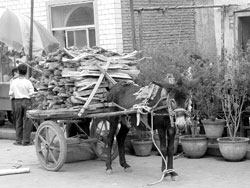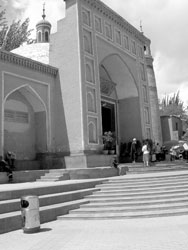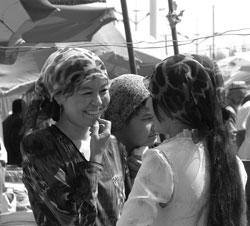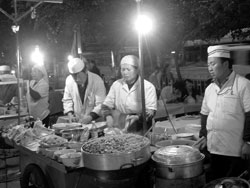Off the beaten path in China
My wife, Joan, and I are inveterate independent travelers with 45 years’ international experience. We usually travel by car or rail, with vaguely planned itineraries and seldom with prebooked overnight accommodations.
We lived in Chengdu, China, from January to May ’05 and traveled widely throughout the country. Our “organized” tours included five nights on a 3-star Yangtze boat with two Italian tourists and 162 people who spoke only Chinese and a one-day round-trip minibus tour from Kunming to the Stone Forest with 16 Chinese tourists. Following are some tips on traveling in China.
When you book a tour, rest assured that you will see only what the Chinese government wants you to see, unless you’re prepared to assert your independence. Chinese tour guides detest confrontation (as is customary among the Chinese), so if you can be insistent without being an ugly American, you don’t need to go to the preordained tourist-trap shops.
Do your homework. Review travel books, even those you normally might not use (such as the Rough Guides).
Regarding accommodations, a cardinal rule we live by is “avoid American or other internationally owned hotel chains.” If you do have the freedom to change travel plans, in Beijing, why not, for example, stay in a hutong hotel rather than an international 5-star?
Regarding food, avoid the tourist “spinner dinners” and walk into restaurants that are teeming with Chinese families. Even in Beijing, two can eat well for, perhaps, less than 50 yuan (about $7.50) if they eat with working-class Chinese.
A food hint for all travelers in China — always order the cheapest meat on the menu (it will be either plain chicken or pork), never the more “exotic” meats, which are likely to be entrails or perhaps snake or even dog. Also, don’t eat anything that’s not cooked. We never felt out of place by looking at what the other patrons were eating and referring to their dishes when ordering.
Since I was teaching at the Southwest University for Nationalities (i.e., non-Han minorities), we tried to travel to my students’ home cities. Especially recommended is Lijiang (Naxi minority) and its surrounds. There we stayed at the Zen Garden Hotel (36 Xingren Alley, Wuyi Road, Dayan Town, Lijiang, China; phone 86 888 5189799), which we recommended to many of our friends. Rates at the time of our visit began at 200 yuan (about $30) per person, including a superb breakfast. The current rates are $74-$176.
Another of our favorites was Yangshuo (Zhuang minority). Many “ordinary” tours include a trip down the Li River from Guilin to Yangshuo, but almost all return to Guilin and do not stay the night in Yangshuo. Big mistake! One of our best side trips was a bicycle/raft tour on the Little Li River. There will be several bike rental shops and guides on the streets to help you in Yangshuo.
Our guide in Yangshuo was Mei Tao, or Tao Taomeifeng (e-mail mei_5026@hotmail.com), whom we found at a bike rental shop on upper West Street. For the two of us, we paid her the equivalent of $30 for the day plus the bicycle rentals and the rental of a small boat on the Little Li River (a total of about $60).
And do go to the Sanjie Liu opera spectacle there; it has a 500-person cast. An ordinary ticket still costs 188 yuan, or about $27. Mei Tao helped us get tickets.
Our favorite Yangshuo hotel was the Hongfu Palace (phone 0086 773 882 9489, e-mail levotre@hotmail.com) on West Street, near the Sihai Hotel. It costs 150 yuan per person, without breakfast.
While Urumqi is a wonderful introduction to the Uyghur minorities, the place where one can truly experience Uyghur culture and the incredible markets is Kashgar in westernmost China.
The Chinese seem to be destroying Kashgar in the same manner that was employed in Lhasa, by surrounding the Old Town with ugly modern buildings. The Chinese will tell you that the Old City isn’t safe at night. That may be so for the Chinese, but we were welcomed wherever we went in the Uyghur parts of town.
The weekend market in Kashgar is an experience not to be missed.
If you have the time, a visit to unspoiled Karakuri Lake, at an elevation of almost 12,000 feet, is sublime. Try to do this on a Monday, when you can also stop at Upal Village and experience its market — more intimate and infinitely less sophisticated than the one at Kashgar.
In Kashgar we stayed at the badly named Wen Zhou Mansion Hotel (No. 17 Renminn West Road, Kashgar, Xinjiang, China; phone 86 998 2808889), a typical Chinese 3-star that had indifferent rooms, an abysmal buffet breakfast and apathetic service. Prices currently run $38-$170.
An alternative in Kashgar is the Seman Binguan, or Seman Hotel (Seman Lu 337; phone/fax 0998 255 2861), formerly the Russian Embassy, but this is not as centrally located as the Wen Zhou. Prices are $16-$195.
LESTER NEIDELL
Tulsa, OK




